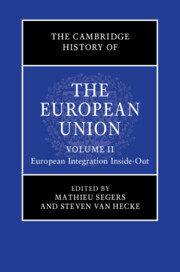Book contents
- The Cambridge History of the European Union
- The Cambridge History of the European Union
- The Cambridge History of the European Union
- Copyright page
- Contents
- Figures
- Tables
- Contributors to Volume II
- Acknowledgements
- Abbreviations
- Reflections on the History and Historiography of European Integration
- Part I Milestones: Treaties and Treaty Changes
- Part II Instruments of Integration
- Money and Society
- Challenges of Expansion: Protection and Security
- 12 The Institutional and Legal Culture of European Integration
- 13 The Formation of the Migration Regime of the EU
- 14 The Constitutional Dimension: Centralisation, Democratisation and the Rule of Law
- 15 EU Enlargement: Origins and Practice
- Part III Narratives and Outcomes
- Index
- References
13 - The Formation of the Migration Regime of the EU
from Challenges of Expansion: Protection and Security
Published online by Cambridge University Press: 12 October 2023
- The Cambridge History of the European Union
- The Cambridge History of the European Union
- The Cambridge History of the European Union
- Copyright page
- Contents
- Figures
- Tables
- Contributors to Volume II
- Acknowledgements
- Abbreviations
- Reflections on the History and Historiography of European Integration
- Part I Milestones: Treaties and Treaty Changes
- Part II Instruments of Integration
- Money and Society
- Challenges of Expansion: Protection and Security
- 12 The Institutional and Legal Culture of European Integration
- 13 The Formation of the Migration Regime of the EU
- 14 The Constitutional Dimension: Centralisation, Democratisation and the Rule of Law
- 15 EU Enlargement: Origins and Practice
- Part III Narratives and Outcomes
- Index
- References
Summary
International migration regimes refer to the way states interact when there are flows or pressures for flows of people with the prospect of lasting settlement across their borders. States generally enforce border checks, recognise only a limited right of residence, reduce social security rights outside the country of employment and deny civic rights for migrants. In Europe in the late 1940s, states routinely responded to migration flows with such cumbersome and arbitrary administrative practices. Today, in contrast, the regime of migration between the member states of the European Union (EU) displays openness. Migrants’ social security rights are exportable, and they benefit from civic rights. Deep closure towards low-skilled migration from outside Europe also characterises this regime, however. During the post-war decades, change has defied continuity, and today’s liberal migration regime has achieved depth, width and longevity, making it without equivalent in modern history.
- Type
- Chapter
- Information
- The Cambridge History of the European Union , pp. 360 - 384Publisher: Cambridge University PressPrint publication year: 2023

